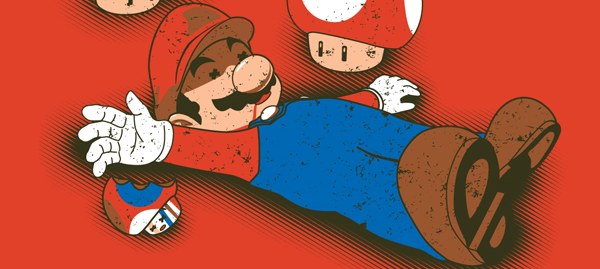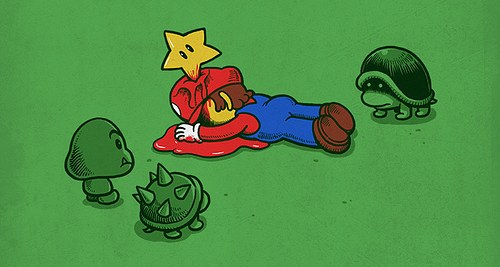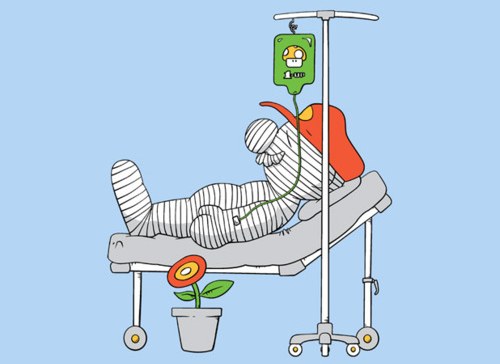Let Trigons Be Trigons: On Killing Gameplay pt.2
 Friday, March 8, 2013 at 4:59PM
Friday, March 8, 2013 at 4:59PM Part 1. The following response to Why We Need to Kill Gameplay To Make Better Games is the core of my critique in this series. Read the original article if you have the time.
We love video games for being video games, right? ... I mean, I still like video games when they are video games. It’s just that I love them when they are not.
Here is five well known action-adventure games. BIOSHOCK. MODERN WARFARE 2. GRAND THEFT AUTO 3+. RED DEAD REDEMPTION. UNCHARTED 3.
Think about your favorite, most memorable moments from the single player part of each, then read below if I have managed to guess any of these moments. [lists examples]
What do all these moments have in common? They are game-free. They are gameplay-less.
Adrian is as clear as can be. He likes gameplay well enough, but he "love[s]" "game-free" or "gameplay-less" moments in games. Remember the bold statement I opened with in my series A Defense of Gameplay: "Modern gamers do not like gameplay." Adrian is the kind of gamer that I had in mind.
For the record, my favorite moment in BioShock was out maneuvering a Big Daddy up a spiral staircase using land mine traps, or hiding underneath the boardwalk as Big Daddys and splicers battled around me. For the record, my favorite part of Uncharted 3 was throwing a grenade past an enemy, running forward, and as the explosion launched the enemy at me, jumping and doing a mid air punch to spike him down. Yes, all of my most memorable and favorite moments in these games are gameplay moments. More on this shortly.

Tragic Ending-red by valiant-thor
If we understand gameplay as something that a challenge is a crucial part of, then none of these moments features any gameplay. You just walk, or swim, or ride a horse, but that’s it. You cannot die. You don’t make choices that have any long term consequences. No skill is involved.
There is no gameplay.
In other words, certain things worth remembering from certain video games are not what these video games are all about.
It's no secret that most video games feature moments where there is no gameplay. This has been the case all the way back to games like Super Mario Bros. Remember what happens after you beat World 1-1? There's a cut scene transition between the overworld setting of 1-1 and the underground setting of 1-2. Likewise, many games feature wonderful non-gameplay content like story scenes, thematic music, and stunning visuals. Not all of this content is presented simultaneously with gameplay. Yet, this doesn't mean that the gameplay isn't designed to work with these elements to strengthen each other. It's common for games to have moments of low challenge to give players time to reflect on challenges overcome and what lies ahead.
So there's no doubt that any of the wonderful content in games is "worth remembering." Adrian makes a mistake when he assumes what "these video games are all about." There's a difference in liking a smaller, less prioritized part of a large complex work and claiming that this smaller part is what the whole work is "about." It's easy to wrongly assume that the work would be more effective if it only focused on the part you like.
Because it means we still don’t understand video games. And if [we] love them so much already, imagine what will happen when one day we will actually understand them.
The fact that gamers can like the non-gameplay aspects ( music, sound, story, or visuals) of a game more than the gameplay does not mean that we "still don't understand video games." It simply means that people like what they like. Nothing more. Adrian claims that we don't understand video games and then extends his rash thinking by expressing his hope for games can be; "imagine what will happen." We saw the same kind of hopeful promise in the future of gaming from Tevis Thompson. For gamers looking for games to be everything but gameplay, for the gamers who want to explore virtual words instead of structured rule based scenarios, for gamers who want games to be "more," these gamers have, in my experience, the most unsatisfiable hope. It's too easy to want video games to be works that are impossible to design rather than appreciate games for what they are.

If you read discussions like Most Jaw-dropping Scenery or Sequence in a Game you can see that the things that people remember from their favorite games are:
+ Beautiful places
+ One off events like a helicopter boss fight or escaping a house on fire
+ Gameplay-less experiences like exploration or short interactive dramasAnd, on the other hand, in threads like that no one ever talks about the regular gameplay. No one mentions combat zones, jumping sequences, or enemy variety.
This is an interesting point that Adrian brings up. And drawing on examples from the gaming discourse is a move straight out of my book; I respect Adrian for this. He evens echoes what I've claimed in my series The Verdict on Video Games, Critical-Casts: Trigon, and its B-Side conversation. In my articles, I explained that the view of game-as-art, which is essentially gameplay focused, is the view in most danger of being dropped within the gaming culture. The reason is because the gaming industry and culture lacks the language to talk about gameplay. Without the language to understand and talk about games, the community will not share, talk about, value, and request gameplay focused experiences. Like what Matt Fairchild mentioned in the B-Side episode, when no one is talking about something that's when we should be worried about its longevity.
It's easy to talk about pretty looking things or exciting set pieces. It's easy to talk about a concrete event rather than a collection of invisible rules. I only have a few points to make on the lack of gameplay examples discussed in the discourse. I don't think people have the language to talk about gameplay in depth, but I do think that we all can talk about it well enough. Much of learning can be understood as a the process of internalizing ideas, which we store as a collection of statements, which we form through language. So as we play, we're engaged with a dialog in our minds. Not all of it is explicitly verbalized as words in our heads, but it's close enough. We think... maybe this will work, no I can't do that because I need something else over there.. but where do I get it? I believe that people simply aren't used to sharing this inner dialog with others because it's so natural, private, and most importantly, because there aren't a strong examples of this happening in our discourse, let alone from the leaders in the video games industry.
Finally, the games Adrian listed are AAA games with a strong focus on set pieces and story elements with two of the games being open world games. These kinds of games appeal to players who like such content. If Adrian had a more diverse pool of comments to draw from or if he ventured into a gameplay focused community like with fighting games, then the conversation would be a lot different. In those threads, players are constantly sharing gameplay videos, discussing strategies, and researching game data to an incredibly detailed degree.

mario-game-over teefury.com
In other words, game experiences we love to share with others are usually not about the regular second to second gameplay. Our brains don’t consider it worth remembering, and the only thing we usually have to say for it – especially months or years after we finish the game – is that “the gameplay was cool”.
First of all, judging value of content simply based on what you remember is a very unreliable and subjective method. Most people don't have very good memories. As for me I still remember the strategies and thought processes that I had playing video games when I was 3 years old. I remember playing all my old NES games with my brother and coming up with strategies together. I remember what the graphics looked like, what the games sounded like, where in the room the TV was position, and, of course, my gameplay strategies, feelings, and actions down to the timing of button presses. Put simply, I have a good memory.
My brain considers many aspects of a given experience worth remembering. I also have a detailed way to embrace experiences because of my various backgrounds in art, music, literature, athletics, etc. It's through my history of hard work and practice that I have the capacity to break down the world around me, organize it, and eventually express it. This background helps me remember experiences better, even the ones that I don't like so much. Ultimately, our ability to remember is based on what we like (which tends to stick better) and how we think (which is strongly shaped by our language). Can you see how language is a big factor in how the gaming industry can grow?
Using a lack of shared player memories about gameplay from some games in some communities as an argument against the value of gameplay is a very short sighted stance to take. But I want to focus on how this stance overlooks the importance of individual working parts and how they support such memorable experiences. As I mentioned above, non-gameplay parts are designed to enhance gameplay parts and visa versa. It's hard to understand this mutual relationship by zooming in on one part alone.
Do you remember the word to word interactions in a novel after you finish it? How about the sentence to sentence meaning? No? Well, does this content build up to larger ideas over time that you tend to remember better? The answer is probably, yes. So while I think asking a gamer to recall their gameplay experience from second-to-second is a bit much to ask of anyone, I argue that those seconds are part of a whole. And when you look at a gameplay experience from moment-to-moment, jump-to-jump, mechanic-to-mechanic, tactic-to-strategy, or between interesting choices you get increasingly more articulate responses from players.
In part 3 we finish with Adrian's article.

